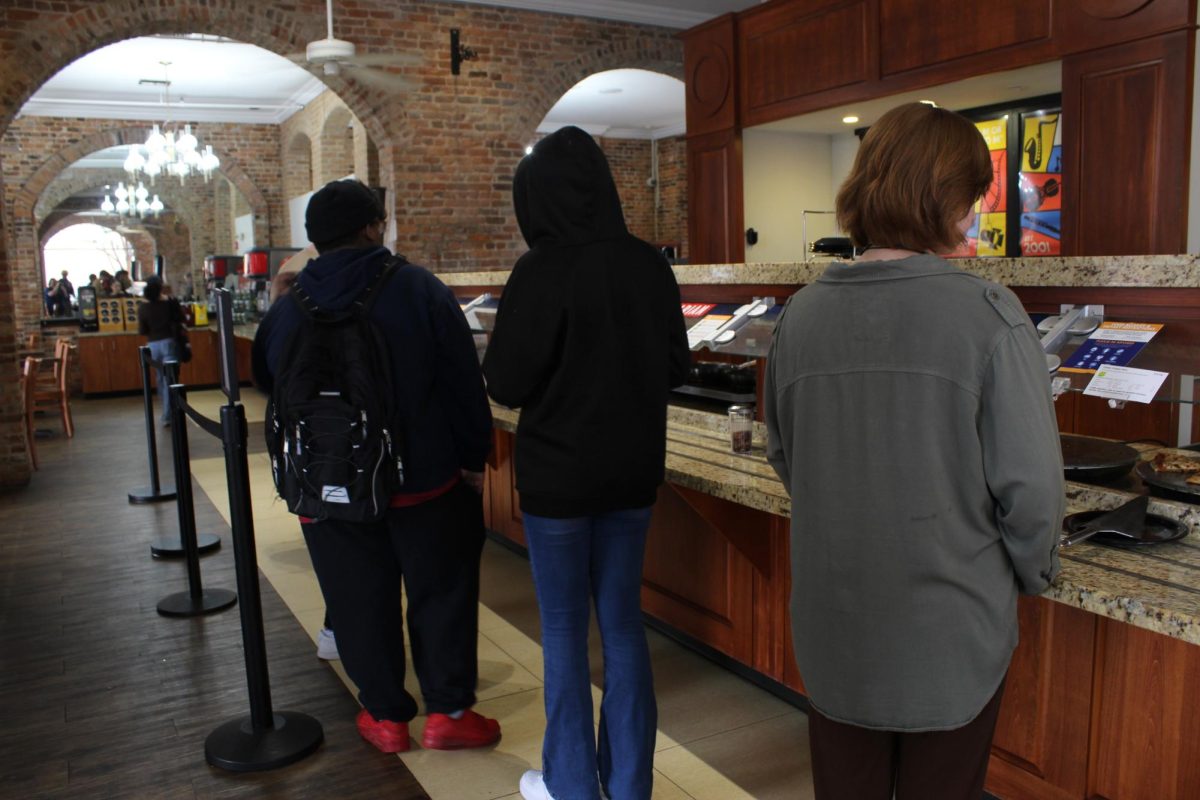OPINION: CSU’s mandatory meal plan policy, which requires those in campus housing to purchase a meal plan, puts unnecessary financial strain on CSU students at a price that doesn’t match the quality of service provided. It’s high time this policy was removed.
College is expensive; being a full-time student puts limits on work availability and can be a stressful time of life to be employed. Amidst the costs of tuition, housing, and even transportation, university meal plans are meant to alleviate the hassle of purchasing groceries and cooking while also providing students with a cost-effective alternative to handling their own meals. Yet at Columbus State University, the high sticker price, lack of variety and healthy options, and mandatory purchase policy for students in housing mean that meal plans become a stressful investment rather than a beneficial one.
The CSU All-Access meal plan is one of the priciest — costing a whopping $2,300 for one semester — and is a required purchase, unless one wishes to spend $2,635 on All-Access+, for all first-year students living on campus; in Fall 2022, this encompassed 50% of all first-year students. Students living on campus who are past their first years can opt for a marginally cheaper meal plan — from $1,580 to $2,202, with significantly less food provided — but are not permitted to refrain from purchasing one. The meal plan charge is essentially paying for two separate things: firstly, the food itself, and secondly, the food service. So, while the meal plan may cost more than buying your own groceries, it would be argued that this difference in price covers food preparation and service, and thus the student is getting his money’s worth.
But what does your money’s worth of food look like?
The U.S. Department of Agriculture offers financial advice detailing how much money should be budgeted for groceries each week or month, categorized by age and sex; these suggestions are grouped into three price ranges: the “low-cost” plan, “moderate-cost” plan, and “liberal” plan. According to information the USDA collected in November 2023, the most expensive of these guidelines — male 19-50 years, the “liberal” plan — prices a semester’s worth of food, calculated as 114 days, around $2,006, a few hundred dollars cheaper than what CSU is charging. This number provided by the USDA is the (expensive) price for nutritious dining — a key factor that CSU dining doesn’t consistently provide. The extra hundreds of dollars could, again, arguably cover food service, but this price is only comparable to the USDA’s recommendation if you’re already spending such a high amount on food supplies anyway — and most college students aren’t, given that there are much more affordable options, as the USDA’s report makes clear; the moderate-cost plan for this same demographic rounds to $1,651 per semester, and the low-cost one budgets approximately $1,317 for the same time frame.
The question then arises: is CSU consistently providing premium food and service to its customers, which would warrant such a high price? CSU’s dining and catering services are operated exclusively by Aramark, a commercial food service company that operates in various establishments, including educational facilities and prisons, in the United States and elsewhere; Aramark’s partnership with CSU lasts at least as far back as the year 2000. Aramark facilities nationwide have historically faced issues with sanitation and nutrition, which the Uproar has covered in a previous article. “Clean” plates at both the Cougar Cafe and Rankin Den frequently have hardened food on them. The vegan and vegetarian options are limited, and no other diets are readily accommodated for; not even gluten-free choices are supported.
In terms of nutrition, an Eat Well menu highlight is advertised and indicates foods that are “lower in calories, saturated fat, and sodium AND [are] at least one full serving of nutritionally dense ingredients like vegetables, lean protein, whole grains or fresh greens.” After reviewing a week’s worth of dinners served at the Cougar Cafe and calculating the number of Eat Well menu items out of the total daily dinner meal items, based on the menu provided on the dining website, the amount of food items with this label was found to average 5.8% per dinner; the highest percentage of Eat Well items for a single dinner was 9.1%, the lowest was 2.5%, and the median was 6.5%. The hours of the dining halls are also notably limited; while “all access” sounds enticing, it becomes less exciting when one realizes that there is no breakfast on weekends, and at lunchtime on these days, breakfast is served; there are significant shutdowns in the dining halls over the weekends, limiting students to a few options only, and the 11am to 1pm window for “lunch” on weekends serves exclusively breakfast food. While the dining halls are advertised to be open all day, trying to get something to eat from either location between 2 and 5 is likely to end without success; most of the food is cleared out during this time. Dinner closes as late as 9pm and as early as 7pm, and on weekends, there is only a two-hour window for each meal; since no breakfast is served, this means the dining halls are open for a total of four hours a day on Saturday and Sunday.
Furthermore, some students report feeling ill after eating at the dining halls, particularly the Rankin Den downtown. “[T]he food was actually bad too… all of us got tummy aches after eating it,” writes senior Art major Robin Edelman of his experience with some friends at the Rankin Den.
For a price comparison, the University of Georgia, which Niche ranks #1 in the state and #11 in the country for its dining, charges $2,129 for its All-Access plan, a notably cheaper price compared to CSU’s alternative — in fact, CSU’s All-Access price is among the most expensive in the state. UGA also has more dining halls, a wider variety of cuisines, including diet-friendly options, and much more generous hours of operation than CSU’s dining spaces. Furthermore, the university offers meal plan scholarships to cover this cost for students who may be struggling financially; despite charging more for dining services, CSU does not. And italicized at the top of UGA’s dining services page for first-year residents is this: All UGA meal plans are completely voluntary.
At CSU, the lack of product separation between the purchase of a meal plan and the purchase of housing, wherein the purchase of campus housing mandates that one also purchases a meal plan, is known legally as “tying;” this refers to when the purchase of one product requires the purchase of another. CSU has been tying meal services with housing since at least 1998. Tying is a potentially anticompetitive practice; the term “anticompetitive” in law refers to practices related to or leading to monopolization. For further information, monopolization, restraint of trade, and tying are addressed in detail in the Sherman Antitrust Act of 1890 and the Clayton Act. To summarize the legal consensus on tying, the practice is lawful under the conditions that the scenario is deemed both reasonable and procompetitive — that is, encouraging to trade/market exchange; if tying multiple products is deceitful, forceful, or significantly harmful to the customer, it is likely considered unreasonable, and if it monopolizes or attempts to monopolize any product, it is anticompetitive. As explained by the Federal Trade Commission, “the general rule is that tying products raises antitrust questions when it restricts competition without providing benefits to consumers.” Keeping this in mind, there is some debate to be had regarding whether CSU’s tying of a housing purchase with the purchase of a meal plan is truly helping students, as it claims to, or if it is causing more harm than good.
Ultimately, while some students may find the convenience of CSU’s meal plans beneficial, for others, it provides financial strain which could be easily avoided without the forced purchase of a meal plan, especially considering the lack of dietary and nutritional support the Columbus State University dining halls provide. For this reason, it is in the best interests of the students at CSU that the mandatory meal plan policy is removed, so that each student is enabled to make the decision that best supports his financial and dietary needs.










